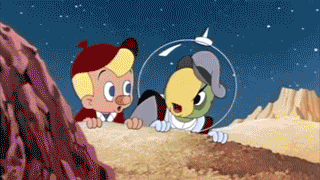In our hed gif today, we are watching a segment from Pinocchio in Outer Space, a 1965 feature-length animation written by TV film writer and producer Fred Ladd and Filmation co-founder Norm Prescott, and produced by by Belvision Studios out of Belgium. The movie was released in the US by Universal Pictures. If all that cross-over of talent and studios isn’t messy enough, the premise of the movie plucks Italian Carlo Collodi’s fictional wooden boy character from his 1883 novel (The Adventures of Pinocchio) and, riding the 1960’s popularity of themes driven by the space race, sends him into the cosmos with a turtle-like alien.
Animated feature matinees for kids were still a popular draw for 60’s theaters, and Universal was clearly hoping that Pinocchio in Outer Space would help them carve out a part of that lucrative market. Disney, having their own Pinocchio animated hit in 1940, were not pleased with Belvision’s adaptation of the story, but there was little they could do as the wooden boy character was in the public domain. However, there were concessions that Ladd and Prescott made to ensure that their script was different enough to not get into copywrite trouble, perhaps the most obvious being that Pinocchio’s sidekick was changed from a cricket to a space turtle.
In the feature—set after the events of Collodi’s book (or the Disney movie, if you prefer)—Pinocchio the “real boy” has been transformed back into a wooden puppet, a punishment for backsliding into his naughty ways. Yes, there is lot of moralizing in the movie, which, let’s face it, was a feature (and still is) of a lot of kid-focused (or even adult-oriented) movies. The lessons come off feeling a bit heavy-handed here, although to be fair, the theme of Pinocchio in all his guises is that virtue is rewarded and vice is punished; in fact, in Collodi’s first telling of Pinocchio as a short story, published in a children’s magazine, Pinocchio’s wicked behavior leads to his being hanged from tree. Kids magazines were a lot darker back in 1881!
But back to the space movie… puppet Pinocchio is still living with Geppetto the wood carver, who encourages the youngster to focus seriously on his studies to aid him in his goals of becoming an astronaut, a profession made more dangerous due to a rampaging space whale destroying any ships that any country sends into space. That’ll keep the space race pretty even, eh? Pinocchio decides that he will take the easy route and defeat this space whale by learning hypnosis from a book that the cagey fox and cat (inexplicably a beatnik now) sell him. As luck would have it, Nurtle the Twertle lands his spaceship nearby and Pinocchio convinces him that he’d be a valuable companion on the Twertle’s mission, investigating radiation on Mars.
Did I mention that this was messy? The plot is a little crazy. Somehow, though, it manages to work. There are a few visual gags that had me smiling, and what seems like disparate plot twists all tie together pretty well at the end. Although I have to be honest, I believe they could have resolved a few elements more fully instead of copping out with a hand-wavey “we’ll just never know.”
Don’t expect high art, but it’s a pleasant move for kids—provided they can handle a few tense moments, like escaping from Martian crabs (eiyee!)— and I think adults will at least appreciate the audacity of the effort. The animation is well done, and the songs are enjoyable, albeit a bit saccharine at times.
The blue fairy will be watching the action, judging if Pinocchio will again merit a conversion from puppet to human. You too can join her by clicking the video below, impressively restored by YouTuber that jalopy.
Pun footnote: On Mars, days are measured in “sol” units. More info on that in the link on timekeeping on Mars.
Wikipedia: Pinocchio in Outer Space
Cartoon Research: "'Pinocchio in Outer Space' (1965) Just for the Record" by Greg Ehrbar, 6/25/19
Shock Cinema: "PINOCCHIO IN OUTER SPACE (1964)" by Steven Puchalski, 1998
Universal Studios Wiki: Pinocchio in Outer Space



Obviously, the beatnik cat was Fritz
This wasn't the only derivative Pinocchio made in that decade- Rankin-Bass' "New Adventures of Pinocchio" TV series took even more strange liberties with the original story around the same time.